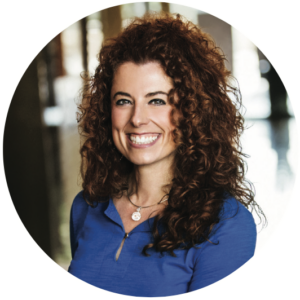Mandi Freger is a licensed counselor in Pittsburgh. She specializes in help for families of people with autism spectrum disorders (ASD) using energy psychology techniques. Her book, From Exhausted to Energized: A Guide for Caregivers of Children and Adults with Autism Spectrum Disorder, delves into the many ways that energy psychology techniques can make a world of difference to family members of people with autism spectrum disorders.
Help for families of people with autism: The people of energy psychology
Help for family members of people with autism
Mandi found her niche and her passion working with people with ASD. She worked in hospital and outpatient settings and became director of autism services in a hospital system affiliated with Cleveland Clinic Autism Development Solutions. Eventually she transitioned to private practice, specializing in ASD.
Early in her career, she joined ACEP-founding-member Greg Nicosia’s practice right out of graduate school. She became an ACEP member in 1999 and went on to chair the education committee and serve on the board of directors. During her years of working and serving with Greg and ACEP, she travelled the country, assisting in energy psychology trainings.
The ASD service cliff + Mandi Freger = solutions, service, and opportunity
People on the autism spectrum age out of services at 21, and then few resources or services are available.
“When I originally went into private practice 8 years ago, the ASD population was very underserved in outpatient settings. Aging out of most services at 21, few services were available,” she says.
“I thought I could condense family behavioral training with individual treatment through outpatient services and that is what I set out to do.”
Finding a need and filling it
Mandi says she had not planned on being a therapist, having grown up in an entrepreneurial family, and she studied business in college. However, the Universe had other plans, and “dropped” her into her job with Greg and her career. Today, service is simply a way of life.
In creating a successful private therapy practice, Mandi combined her clinical skills with business savvy.
“It still blows my mind that one can make a good living from something that seems so easy – counseling and consulting,” she says.
She remains service driven and says she is fortunate to have the tools that match clients’ needs.
Help for families of people with autism
For Mandi, the most consistent gratitude seems to come from families of kids diagnosed with ASD.
“I think they are most appreciative about how I can streamline training and practice for them on the layered complexity of the disorder,” she says.
“Helping, however, is an ongoing conversation. So all of my clients have successes, if goals are appropriate and effective from the start of treatment.”
Mandi is proactive in helping people define goals and measure progress. In her sessions, she focuses on processing the emotions, then moving forward with action. A change in some troublesome action, in turn, contributes to more positive emotions.
Looking forward
Looking to the future of energy psychology and mental health therapy in general, Mandi says we need strong energy psychology mental health practitioners to provide support and coaching to people around the world.
Energy psychology is becoming mainstream, but not necessarily in the hands of people with strong clinical skills and training. We risk diluting the field with pop-culture influence and misinformation.
“The difficult thing is that most are not clinical mental health providers and that can significantly change the lens through which one sees the issues of importance. However, relatively few have mastered the art of using these tools, including practicing good clinical and energetic boundaries and hygiene, and I think that is where the need will remain,” she says.
Feeling inspired?
Want to learn more about the tools and theoretical framework of Emotional Freedom Techniques? Check out ACEP's free master class here. Be sure to check out Mandi’s book here.
Author
Sarah Murphy, LPC, ACP-EFT, is a counselor in private practice and specializes in working with people who have serious illnesses. A student of the Ageless Wisdom, she is dedicated to sharing the Great Invocation.
Photo by Nathan Anderson on Unsplash




